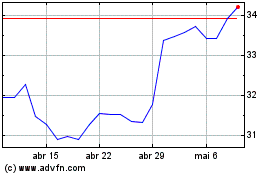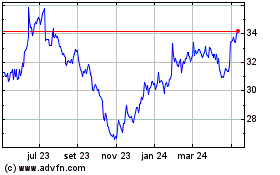Corning Introduces Next-Generation Cordierite Filter for Light-Duty Diesel Vehicles; Advanced Particulate Filter Provides Lasti
27 Abril 2006 - 3:30AM
Business Wire
Corning Incorporated (NYSE:GLW) announced today that it will begin
supplying a new, advanced cordierite diesel particulate filter to
light-duty diesel vehicle manufacturers. Compared to traditional
cordierite, Corning's monolithic DuraTrap(R) AC filters offer low
pressure drop to help reduce fuel consumption and increase the
power rating. They also offer improved thermal durability and
high-filtration efficiency. DuraTrap AC filters are targeted to be
the first cordierite filters used in large-scale for diesel
passenger cars. They are optimized for use in light-duty diesel
vehicles that have new and advanced regeneration systems. "With
more than thirty years of experience working with cordierite and a
deep understanding of emissions control technology, we were able to
develop an advanced cordierite filter that, we believe, has unique
properties and performance capabilities for the light-duty diesel
market," said Thomas R. Hinman, vice president and general manager,
Diesel Technologies. "The early response from global diesel auto
manufacturers on our new DuraTrap AC filter has been extremely
positive and we are continuing to collaborate with our customers
regarding future applications for this product." DuraTrap AC
filters offer a unique performance combination of relatively
high-soot-mass limit with a low pressure drop, compared to
traditional cordierite. The filter's low pressure drop allows for
integrated functionality in catalyzed-soot filter applications. In
addition, the new filter offers outstanding thermal characteristics
and a wide operating window. DuraTrap AC's high-filtration
efficiency will help light-duty auto makers to meet the
increasingly stringent Euro V emissions regulations. Corning will
begin manufacturing and supplying DuraTrap AC filters in the first
half of 2007. This is the second filter for light-duty diesel
applications that Corning has launched. In 2005, Corning introduced
DuraTrap(R) AT filters, which are being used by leading auto makers
for light-duty diesel applications as an effective alternative to
systems designed for silicon carbide. Corning invented an
economical, high-performance cellular ceramic substrate in the
early 1970s that is now the standard for catalytic converters
worldwide. In 1978, Corning developed the cellular ceramic
particulate filter to remove soot from diesel emissions. About
Corning Incorporated Corning Incorporated (www.corning.com) is a
diversified technology company that concentrates its efforts on
high-impact growth opportunities. Corning combines its expertise in
specialty glass, ceramic materials, polymers and the manipulation
of the properties of light, with strong process and manufacturing
capabilities to develop, engineer and commercialize significant
innovative products for the telecommunications, flat panel display,
environmental, semiconductor, and life sciences industries.
Forward-Looking and Cautionary Statements This press release
contains forward-looking statements that involve a variety of
business risks and other uncertainties that could cause actual
results to differ materially. These risks and uncertainties include
the possibility of changes or fluctuations in global economic and
political conditions; tariffs, import duties and currency
fluctuations; product demand and industry capacity; competitive
products and pricing; manufacturing efficiencies; cost reductions;
availability and costs of critical components and materials; new
product development and commercialization; order activity and
demand from major customers; capital spending by larger customers
in the liquid crystal display industry and other businesses;
changes in the mix of sales between premium and non-premium
products; facility expansions and new plant start-up costs;
possible disruption in commercial activities due to terrorist
activity, armed conflict, political instability or major health
concerns; ability to obtain financing and capital on commercially
reasonable terms; adequacy and availability of insurance; capital
resource and cash flow activities; capital spending; equity company
activities; interest costs; acquisition and divestiture activities;
the level of excess or obsolete inventory; the rate of technology
change; the ability to enforce patents; product and components
performance issues; changes in key personnel; stock price
fluctuations; and adverse litigation or regulatory developments.
These and other risk factors are identified in Corning's filings
with the Securities and Exchange Commission. Forward-looking
statements speak only as of the day that they are made, and Corning
undertakes no obligation to update them in light of new information
or future events.
Corning (NYSE:GLW)
Gráfico Histórico do Ativo
De Jun 2024 até Jul 2024

Corning (NYSE:GLW)
Gráfico Histórico do Ativo
De Jul 2023 até Jul 2024
